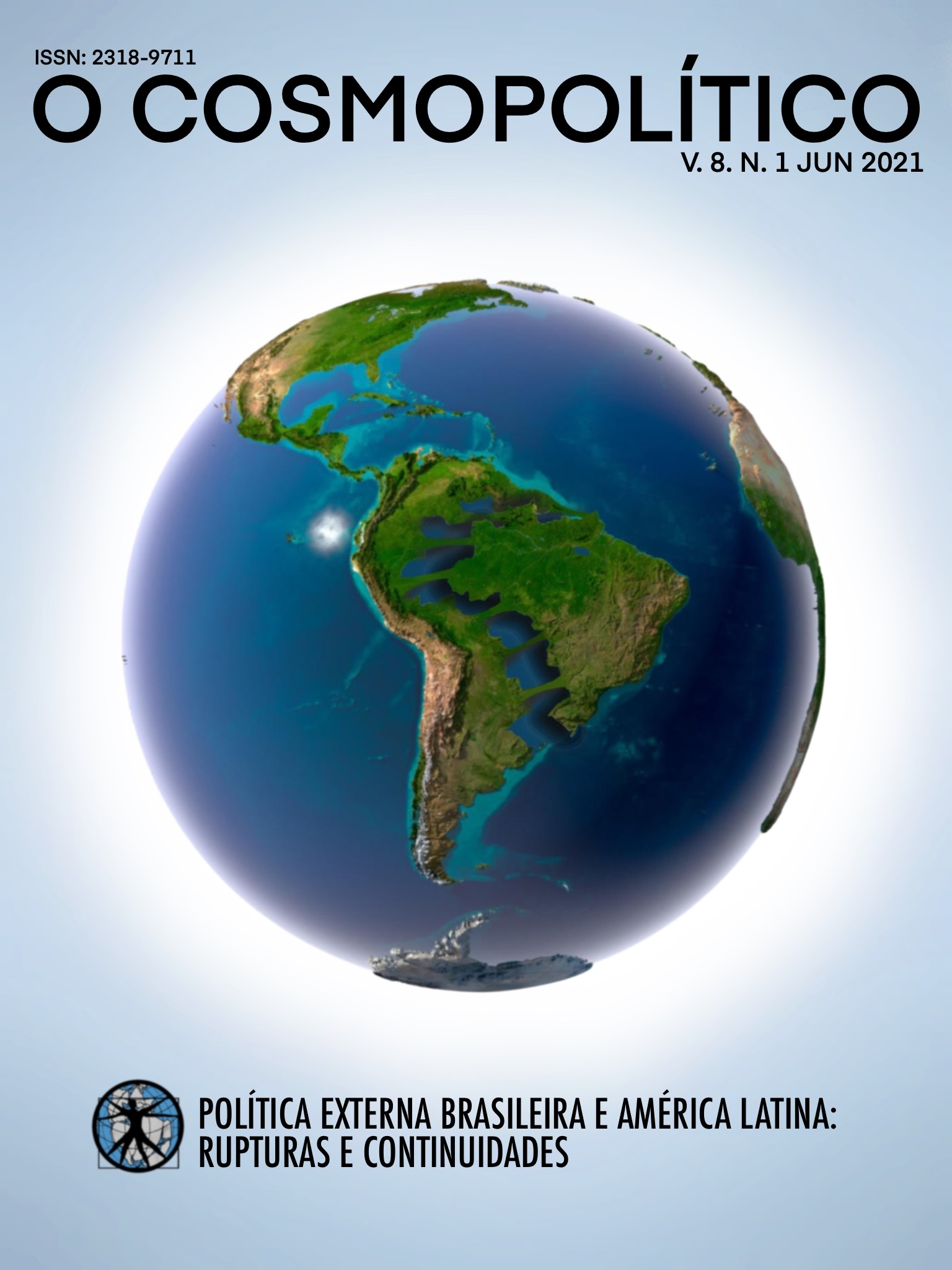PERSPECTIVAS DE GÊNERO E DESENVOLVIMENTO NO CONTINENTE AFRICANO:
UMA ANÁLISE DOS QUINZE ANOS DA RATIFICAÇÃO DO PROTOCOLO DE MAPUTO NA NAMÍBIA (2004-2019)
Palavras-chave:
protocolo de Maputo, igualdade de gênero, Namíbia, continente africanoResumo
A busca pela igualdade entre homens e mulheres não é atual, mas tem sido intensificada a cada ano na medida em que sociedade civil, organizações nacionais e internacionais e os Estados criam mecanismos que combatem a desigualdade de gênero. No contexto africano essa luta tem colocado o continente em posição de destaque no cenário internacional. Criado pela União Africana (UA), em 2003, o Protocolo de Maputo tem por objetivo garantir que os direitos das mulheres africanas sejam alcançados. Dessa forma, os quarenta países que, até hoje, ratificaram o Protocolo, se comprometeram a buscar a garantia de participação plena das mulheres no desenvolvimento africano, integrando perspectivas de gênero em suas decisões políticas e legislações de seus países. Nesse sentido, um dos seus principais aspectos é a implementação de políticas que visem a igualdade de gênero a partir da realidade das mulheres africanas. Dessa forma, o presente artigo busca analisar as perspectivas de gênero no continente africano por meio da ratificação do Protocolo de Maputo na Namíbia. Para isso, procura-se compreender primeiramente quais são as perspectivas de gênero e igualdade de gênero presentes (ou não) no continente africano, a partir de uma revisão bibliográfica desses conceitos com autoras que discorrem sobre essa temática desde a realidade africana. Posteriormente, será feita uma análise documental do Protocolo de Maputo, mostrando suas principais políticas para a promoção da igualdade de gênero. Por fim, será analisada a sua implementação no Estado africano da Namíbia, no período de 2004 a 2019, apresentando os principais dados sobre a...Downloads
Referências
ACHPR. Protocol To The African Charter On Human And Peoples’ Rights On The Rights Of Women In Africa. 2003. Disponível em: https://www.achpr.org/public/Document/file/English/achpr_instr_proto_women_eng.pdf. Acesso em: 09 fev. 2021.
ADÉSÍNÀ, Jimi O. Re-appropriating Matrifocality: Endogeneity and African Gender Scholarship. African Sociological Review. 2010. 14 (I): 219.
AFRICAN UNION. About the African Union. 2021. Disponível em: https://au.int/en/overview.
Acesso em: 09 fev. 2021.
ANISE, Ladun. Foreign Military Intervention in Africa: the new co-operative-competitive imperialism. In: ONWUKA, Ralph I.; SHAW, Timothy M. (ed.). Africa in World Politics: into the 1990s. New York: Palgrave Macmillan, 1989. p. 152-179.
ANYIDOHO, NanaAkua. Women, Gender, and Development in Africa. 2019. In: Falola, Toyin; Olajumoke, Yacob-Haliso (Eds.). The Palgrave Handbook of African Women’s Studies. Londres: Palgrave MacMilla, 2019. p. 1-19.
CENTER FOR HUMAN RIGHTS. Universidade de Pretoria. Maputo Protocol Ratification Map. Disponível em: https://www.maputoprotocol.up.ac.za/index.php/countries/interactive-map.
Acesso em: 20 fev. 2021.
DOSEKUN, Simidele. African Feminisms. 2019. In: FALOLA, Toyin; YACOB-HALISO, Olajumoke
(Eds.). The Palgrave Handbook of African Women’s Studies. Londres: Palgrave Macmillan, Cham, 2019. p. 47-63.
EQUALITY NOW. Ratify the Maputo Protocol: protect the rights of african women and girls. Protect the Rights of African Women and Girls. 2020. Disponível em: https://www.equalitynow.
org/ratify_the_maputo_protocol. Acesso em: 08 fev. 2021.
EQUALITY NOW. Our Impact: regional. Regional. Disponível em: https://www.equalitynow.org/our_impact. Acesso em: 10 fev. 2021.
GRUNDY, Kennethy. The Angolan Puzzle: intervening actors and complex issues. In: ONWUKA,
Ralph I.; SHAW, Timothy M.. Africa in World Politics. New York: Palgrave Macmillan, 1989. p. 198-211.
HAMUTENYA, Hidipo. Namibia and Angola: analysis of a symbiotic relationship. In: BÖSL, Anton; DU PISANI, André; ZAIRG, Dennis u (ed.). Namibia’s Foreign Relations: historic contexts, current dimensions, and perspectives for the 21st century. Windhock: Macmillan Education Namibia, 2014. p. 81-109.
IRENE, Mukumu Wairimu. The Maputo Protocol: Evaluating women’s rights. 2015. Disponível em: https://www.pambazuka.org/gender-minorities/maputo-protocol-evaluating-women%E2%80%99s-rights. Acesso em: 09 fev. 2021.
FOFACK, Hippolyte. Celebrating The Contribution Of African Women To Development In Africa. 2014. Disponível em: https://www.afdb.org/fileadmin/uploads/opev/Documents/Evaluation_Matters_March_2014_-_Gender_Inequality_and_You_-_article__2_.pdf. Acesso em: 09 fev. 2021.
KAH, Henry Kam. ‘Africa and the Gender Debate Today: Basis of Division and Future Union’. Africa’s Many Divides And Africa’s Future: pursuing Nkrumah’s vision of panAfricanism in an era of globalization, Waco, p.169-189, 2015.
KAMAU, Nyokabi et al. Gender Equality in Education Score Card: A Pilot for Nine Countries in
Eastern and Southern African Region. S/l: Fawe, 2012. 117 p. Disponível em: https://fawena.org/resources.php. Acesso em: 09 fev. 2021.
KEVANE, Michael. Women and development in africa: How gender works. 2 ed. Boulder, Colorado: Lynne Rienner Publishers, Inc, 2014. 329 p.
LEGAL ASSISTANCE CENTRE. Namibia Gender Analysis. 2017. Windhoek: Legal Assistance Centre, 2017. 268 p. Disponível em: http://www.lac.org.na/projects/grap/Pdf/Namibia_Gender_Analysis_2017.pdf. Acesso em: 08 fev. 2021.
MAMA, Amina. What Does it Mean to Do Feminist Research in African Contexts?. Feminist Review. 2011;98:e4-e20.
MADHOK, Sumi. Coloniality, Political Subjectivation and the Gendered Politics of Protest in a ‘State of Exception’. Feminist Review, [S.L.], v. 119, n. 1, p. 56-71, jul. 2018. SAGE Publications. http://dx.doi.org/10.1057/s41305-018-0121-z.
MOHANTY, Chandra T. Under Western Eyes. Feminist Scholarship and Colonial Discourses. Feminist Review, vol. 30, 1988, ps. 61-88.
NAMIBIA STATISTICS AGENCY. The Namibia Labour Force Survey 2016 Report. Windhoek: S/e, 2017. 108 p. Disponível em: https://cms.my.na › assets › documents › Labour_Force_Survey_-_20161. Acesso em: 08 fev. 2021.
NAMIBIA STATISTICS AGENCY. The Namibia Labour Force Survey 2018 Report. Windhoek: S/e, 2019. 120 p. Disponível em: https://cms2.my.na/assets/documents/NLFS_2018_Report_Final_.pdf+&cd=2&hl=pt-BR&ct=clnk&gl=br. Acesso em: 08 fev. 2021.
NNAEMEKA, Obioma. Bringing African Women into the Classroom: rethinking pedagogy and
epistemology. In: OYEWÙMÍ, Oyèrónké (ed.). African Gender Studies: a reader. New York: Palgrave Macmillan, 2005. p. 51-66.
OBIORA, Leslye Amede; WHALEN, Crystal. What is Right with Africa: The Promise of the Protocol on Women ‘s Rights in Africa. The Transnational Human Rights Review, Toronto, v. 02, p.153-167, dez. 2015. Disponível em: http://digitalcommons.osgoode.yorku.ca/thr/vol2/iss1/6. Acesso em: 09 fev. 2021.
OECD. Social Institutions and Gender Index. S/l: S/e, 2019. 17 p. Disponível em: www.genderindex.org. Acesso em: 09 dez. 2019.
ONU MULHERES. Declaração e Programa de Ação de Viena (1993). 2022. Disponível em: https://www.onumulheres.org.br/wp-content/uploads/2013/03/declaracao_viena.pdf. Acesso em: 18 mar. 2022.
ONU MULHERES. Sobre a ONU Mulheres. 2021. Disponível em: http://www.onumulheres.org.br/onu-mulheres/sobre-a-onu-mulheres/. Acesso em: 17 fev. 2021.
ONU MULHERES. Declaração e Plataforma de Ação da IV Conferência Mundial Sobre a Mulher. 2013. Disponível em: http://www.onumulheres.org.br/wp-content/uploads/2013/03/declaracao_beijing.pdf. Acesso em: 11 jan. 2021.
OYěWÙMÍ, Oyèrónké. Conceituando O Gênero: Os Fundamentos Eurocêntricos Dos Conceitos
Feministas E O Desafio Das Epistemologias Africana. Codesria Gender Series, Dakar, v. 01, p.01-10, 2004.
OYěWÙMÍ, Oyeronke. “De-Confounding Gender: Feminist Theorizing and Western Culture, a Comment on Hawkesworth’s ‘Confounding Gender.’” Signs 23, no. 4 (1998): 1049–62. http://www.jstor.org/stable/3175203.
OYěWÙMÍ, Oyèrónké. The Invention of Women: making an african sense of western gender discourses. Minneapolis: University Of Minnesota Press, 1997.
PHIPPS, Alison; MCDONNELL, Liz. On (not) being the master’s tools: five years of changing
university cultures⠹. Gender And Education, [S.L.], p. 1-17, 8 ago. 2021. Informa UK Limited.
http://dx.doi.org/10.1080/09540253.2021.1963420.
REEVES, H; BADEN, S. Gender and development: Concepts and definitions. 2000. Institute of
Development Studies, BRIDGE report Number 55, Brighton. Disponível em: http://www.bridge.ids.ac.uk/sites/bridge.ids.ac.uk/files/reports/re55.pdf. Acesso em: 15 out. 2019.
SOAWR. About SOAWR. Disponível em: https://www.soawr.org/content/about-soawr. Acesso em: 10 fev. 2021.
UNDP REGIONAL BUREAU FOR AFRICA. Accelerating Gender Equality and Women’s Empowerment in Africa. 2016. Disponível em: http://www.undp.org/content/undp/en/home/librarypage/hdr/2016-africa-humandevelopmentreport.html. Acesso em: 09 fev. 2021
UNESCO. UIS: educations. Educations. Disponível em: http://data.uis.unesco.org/#. Acesso em:
mar. 2022.
WAD. Home. 2022. Disponível em: https://wad.org.na/. Acesso em: 18 mar. 2022.
WGDD. Maputo Protocol on Women’s Rights: A Living Document for Women’s Human Rights
in Africa. 2016. Disponível em: https://au.int/sites/default/files/documents/31520-doc-maputo_protocol_on_womens_rights_a_living_document_for_womens_human_rights_in_africa_submitted_by_the_women_gender_and_development_directorate_wgdd_of_the_african_union_commission.pdf. Acesso em: 09 fev. 2021.
Downloads
Publicado
Edição
Seção
Licença
Copyright (c) 2022 O Cosmopolítico

Este trabalho está licenciado sob uma licença Creative Commons Attribution 4.0 International License.



